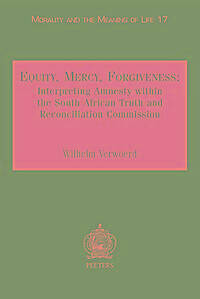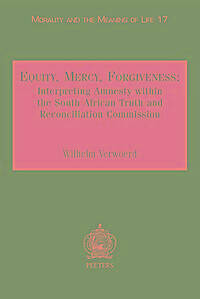
Je cadeautjes zeker op tijd in huis hebben voor de feestdagen? Kom langs in onze winkels en vind het perfecte geschenk!
- Afhalen na 1 uur in een winkel met voorraad
- Gratis thuislevering in België vanaf € 30
- Ruim aanbod met 7 miljoen producten
Je cadeautjes zeker op tijd in huis hebben voor de feestdagen? Kom langs in onze winkels en vind het perfecte geschenk!
- Afhalen na 1 uur in een winkel met voorraad
- Gratis thuislevering in België vanaf € 30
- Ruim aanbod met 7 miljoen producten
Zoeken
Equity, Mercy, Forgiveness
Interpreting Amnesty Within the South African Truth and Reconciliation Commission
W Verwoerd
€ 91,95
+ 183 punten
Omschrijving
The most prominent and troubling criticism of the South African TRC has been that amnesty amounts to a sacrifice of individual justice. Whilst this criticism is taken seriously, the focus of this book is on equity, mercy and forgiveness - three crucial possibilities for making moral sense of the unique amnesty process within the South African TRC. In building up this interpretation the author examines closely some of his personal experiences as a former researcher within the TRC. His search for words to articulate the deeper moral meanings of the amnesty part of the TRC process is developed through a careful analysis of a range of accessible examples from this process. By thus entering in a hermeneutic dialogue with the "sacrifice of justice" criticism this book not only contributes to the unfinished business of morally interpreting a particular TRC process, it also helps to clarify constructive options for other nations struggling to deal with painful pasts.
Specificaties
Betrokkenen
- Auteur(s):
- Uitgeverij:
Inhoud
- Aantal bladzijden:
- 210
- Taal:
- Engels
- Reeks:
- Reeksnummer:
- nr. 17
Eigenschappen
- Productcode (EAN):
- 9789042919068
- Verschijningsdatum:
- 25/10/2007
- Uitvoering:
- Paperback
- Formaat:
- Trade paperback (VS)
- Afmetingen:
- 159 mm x 237 mm
- Gewicht:
- 353 g

Alleen bij Standaard Boekhandel
+ 183 punten op je klantenkaart van Standaard Boekhandel
Beoordelingen
We publiceren alleen reviews die voldoen aan de voorwaarden voor reviews. Bekijk onze voorwaarden voor reviews.









